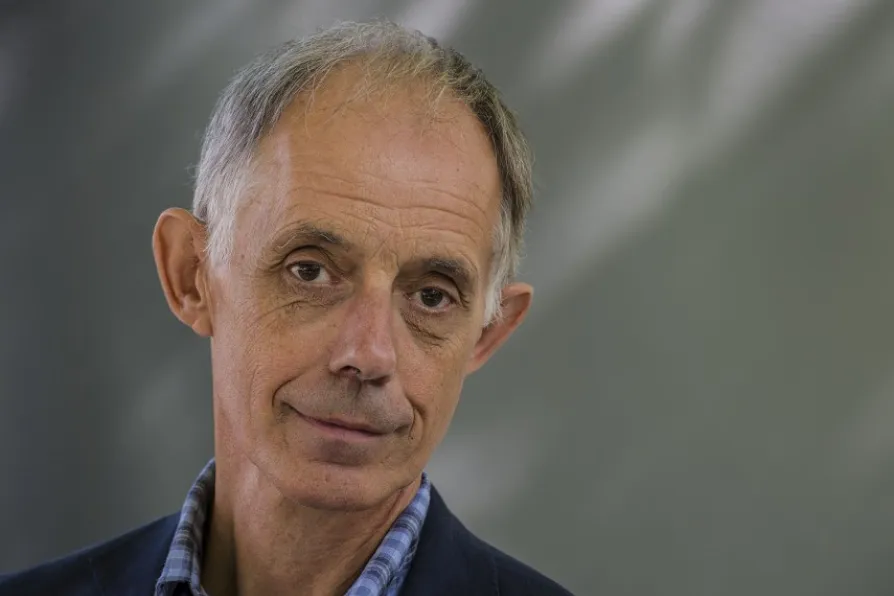When a gay couple moves in downstairs, gentrification begins with waffles and coffee, and proceeds via horticultural sabotage to legal action

 Creature of narrative: Martin Goodman
Creature of narrative: Martin Goodman
Your latest novel JSS Bach is about the generational implications of the Holocaust and garnered praise from the Morning Star as “a masterful, wonderful novel.” How did you come about writing it and what did you draw on?
The basic idea slammed into me while walking in the mountains. In a bid to keep close to historical record, most literary references were non-fiction, mounds of history and memoirs from Ruth Kluger. Laurent Binet’s HHhH touched it a little and other references were derived from site visits – Dachau, a week in Auschwitz, walking through Terezin. WG Sebald shows how you have to walk your way through history.
The novel is the story of of three generations of women living through the horrors of 20th-century German history. In it, a Jewish family is linked to a nazi adjutant at Dachau concentration camp through a shared love of music. How challenging was it to write “another” account of the Holocaust? What were you keen to do differently or avoid?
I was in denial of this being a “Holocaust” account at all until I recognised how sorely we still need those.
My main theme is the inheritance of war guilt and how it is passed on down the generations – how do characters keep on living in the shadow of the Holocaust?
I was keenest to avoid inventing any fresh horrors – any atrocity had to be linked to the factual record.
JSS Bach shows music as both a battlefield as much as a peace process. How important are the arts in interpreting this phenomenon?
The arts don’t make you strong; they make you fragile. Society wants the arts to serve its own ends. We won’t necessarily get the steer we need from the artists that society lauds.
I trust the artists who don’t even trust themselves.
The book glories in its shades of ambiguity. How difficult was it to construct an understandable narrative peopled by the likes of Dachau adjutant Dieter, with his OCD tendencies and love of order, and his wife Katja?
In the 1970s and 1980s, I came to know ex-nazis, men and women, quite well. They were apologists and yet worked to be caring humans.
It took several drafts to get me there but if we deem nazis to have been monsters and not humans we’ll never know them. A guiding question became: “Is the baby of a nazi couple a nazi baby?”
What reactions are you hoping to provoke in your readers from the book's somewhat unresolved but hopeful ending?
We’re creatures of narrative. JSS Bach sees characters adapt to shifting life stories. It ends with a character challenging the protagonist’s own right to privacy, tempted by misadventure. He was provoked by love. It took a dog to show him the way.
If readers ditch fear and follow their inner dog a little, that’ll do fine.
What is the state of left-wing or transgressive fiction in Britain? Which contemporary authors excite you most and why?
It’s largely set in the past or written as a crime novel. Fiction still seems locked in literary form and mildly odd behaviour is reckoned to be transgressive.
In Hull, Russ Litten captures characters others miss. Perhaps science-fiction writer Chris Beckett comes closest to the tradition I recognise.
Katherine Boo vanishes into the slums of Mumbai and comes out with vivid human drama. She’s Zola for anyone who still cares. Helen Garner’s non-fiction reporting turns her world inside out, while Paul Russell is my favourite go-to gay writer.
Norwegian Roy Jacobsen’s The Unseen is like George Mackay Brown back from the dead but possibly better and, from Zimbabwe, Virginia Phiri. “What people don’t want to touch or talk about is what we have to write about,” is her great credo, “especially as women.”
How challenging has it been to run Barbican publishers in the age of discounting and Amazon?
I go around independent stores, give them copies for free, hoping they’ll order and don’t hear from them again. We’d be lost without Amazon, to be honest. Their terms for us aren’t bad.
What new releases have you got planned for the next 12 months?
Colin W Sargent’s Red Hands, an astounding account of the Romanian revolution in the voice of Ceausescu’s daughter-in-law and Maggie Hamand’s trans Vatican thriller Virgin & Child.
There’ll be a beautiful rhymed translation of Petrarch, eco lawyer James Thornton’s new collection Notes from a Mountain Village and a book of stories from ex-prisoners in Hull.
How important is the Morning Star's arts coverage?
For me, writing means finding and telling the counter-story. Entertainment’s grand but art is about subverting what we think we know. What national daily will go out and find art like that for you? There’s just you.
As a writer and publisher, your coverage gives me a sense of community. Someone out there gets it.
J SS Bach is published by Wrecking Ball Press, price £14.


















